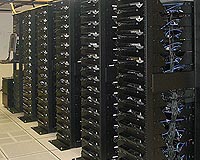 Scientists conduct data center heat study
Scientists conduct data center heat study

disclaimer: image is for illustration purposes only |
by Staff Writers
Atlanta GA (UPI) Jun 4, 2009
U.S. researchers are using a simulated data center to develop new methods to reduce the heat generated by large computer equipment.
Georgia Institute of Technology scientists said about a third of the electricity consumed by large data centers doesn't power computer servers, but instead must be used to cool the servers, a demand that continues to increase as computer processing power grows.
The Georgia Tech scientists are using a 1,100-square-foot simulated data center to optimize cooling strategies and develop new heat transfer models. Their goal is to reduce the portion of electricity used to cool data center equipment by as much as 15 percent.
"Computers convert electricity to heat as they operate," said Professor Yogendra Joshi. "As they switch on and off, transistors produce heat, and all of that heat must be ultimately transferred to the environment. If you are looking at a few computers, the heat produced is not that much. But data centers generate heat at the rate of tens of megawatts that must be removed."
He said five years ago, a typical refrigerator-sized server cabinet produced about one to five kilowatts of heat. Today, high-performance computing cabinets of about the same size produce as much as 28 kilowatts, and machines now being designed will produce twice as much heat.
Summaries of the research have appeared in the Journal of Electronic Packaging and International Journal of Heat and Mass Transfer.
Share This Article With Planet Earth
Related Links
Space Technology News - Applications and Research

 Russia Increases Number Of Operational Glonass Satellites To 17
Russia Increases Number Of Operational Glonass Satellites To 17
Moscow (RIA Novosti) Jun 05, 2009
The number of operational satellites in Russia's Glonass grouping has been increased to 17 while three more remain inactive, Russia's Federal Space Agency Roscosmos said on Thursday. Glonass - the Global Navigation Satellite System - is the Russian equivalent of the U.S. Global Positioning System, or GPS, and is designed for both military and civilian use. Both systems allow users to ... read more
|
 |
|

 Russia Increases Number Of Operational Glonass Satellites To 17
Russia Increases Number Of Operational Glonass Satellites To 17